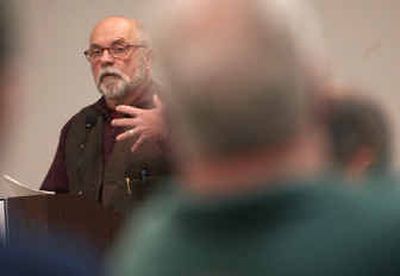Public voices frustration over depot

Organizers of a public meeting focused on BNSF Railway’s recent contamination of the Rathdrum Prairie/Spokane Valley Aquifer were pleased with the turnout of the Wednesday night forum in Coeur d’Alene. But many attendees expressed anger over who did not show up – namely representatives from the railroad or elected officials with authority over the depot.
“If they are good corporate citizens, why aren’t they here tonight?” asked Coeur d’Alene resident Jack Clay.
Kootenai County commissioners said they all had previous engagements. Railroad spokesman Gus Melonas explained BNSF’s absence: “We have been upfront and have provided updates through this situation,” he said, speaking to a reporter from his office in Seattle. “We see no benefit in engaging in a session based on emotion and not on science. However, this certainly doesn’t discount our full attention on this matter as we continue to invest in the necessary resources to ensure environmental protection.”
A long line of residents waited for a chance at the microphone at the first large public hearing on the subject since leaks were discovered in December at BNSF’s depot near Rathdrum, Idaho. The meeting offered no prospects for regulatory changes, but student organizers at North Idaho College said they hoped the venue would give a chance for the public to vent their frustration and develop a strategy to harness opposition.
Most speakers vowed to fight to have the facility removed from atop the region’s drinking water aquifer.
“The only safe depot here for me is one that’s not on that aquifer,” said Post Falls Mayor Clay Larkin.
The view was seconded by Kootenai County Sheriff Rocky Watson. The aquifer is so vast and deep that any contaminants could take hundreds of years to be flushed away, said Watson, who said he loves to study geology.
“Is it worth the risk? Move that damn thing up the hill,” Watson said, adding later that assurances about the contamination only being in trace amounts did not quiet his concern. “I don’t want my drinking water to taste like diesel, even if it’s not enough to hurt my health.”
Ken Lustig, who retired recently after serving as the environmental health director for the Panhandle Health District, said county and state leaders need to do more to protect the aquifer and public health. Although moving the $42 million depot off the aquifer might seem politically unrealistic, Lustig said laws appear to exist that would give the Idaho Department of Environmental Quality the power to act. A closure could be justified under special purity protections granted specifically to protect the aquifer, he said.
“If it has been violated then DEQ is the guardian at the gate,” he said.
Lustig said the county should consider creating a special protection zone over the aquifer to prevent additional contamination from other industries that might choose to locate here.
“Burlington Northern is a symptom of what happens when you don’t have a management process that can embrace this larger problem,” Lustig said. “If we don’t correct the process we’re going to make another mistake somewhere along the line.”
Coeur d’Alene resident Christie Cassel drew applause when she expressed her feeling that government agencies have been too passive.
“What is the point? What is the point of permits and statutes if at all levels of authority, nobody has power over this corporation,” she said. “The EPA, the DEQ, everybody is wishy-washy.”
Spokane City Councilwoman Cherie Rodgers encouraged attendees to keep fighting.
“It’s going to take public pressure for them to have to move that facility,” Rodgers said.
Rodgers also said there are few things more important than protecting the purity of public water resources.
“The next world wars are not going to be about philosophy. It’s going to about resources. It’s going to be about water,” she said. “We deeply need to protect what we have here.”